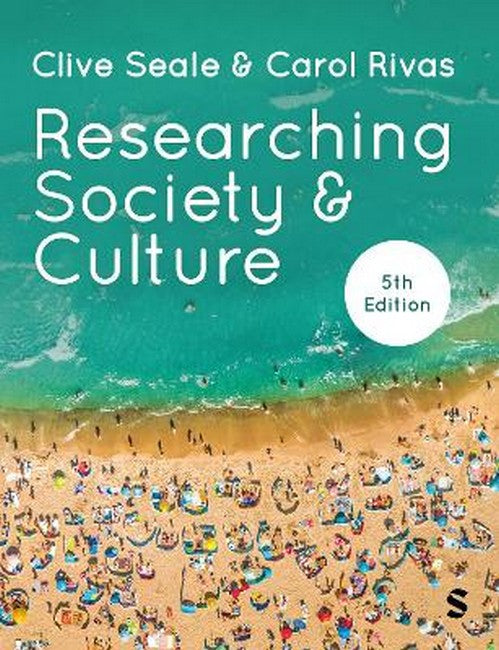Clive Seale has been Professor of Sociology (or Medical Sociology) at Goldsmiths and Queen Marys (both University of London) and Brunel University. His work has concerned communication in health care and death in modern society. He has published extensively on research methods. His books include Constructing Death: the sociology of dying and bereavement (Cambridge University Press, 1998), The Quality of Qualitative Research (Sage, 1999), Media and Health (Sage, 2003) and Gender and the Language of Illness (Palgrave-Macmillan, 2010, with Jonathan Charteris-Black). Recently, he has turned to fiction, publishing a novel, Interrogating Ellie (Cloiff Books, 2015) using the pen name Julian Gray. He is currently writing another novel. Carol Rivas is an associate professor in Social Policy and Programme Evaluation in the Social Research Institute at University College London. For more than 30 years she has undertaken research on chronic health conditions and disabilities, abuse, and vulnerable populations. This has encompassed a range of conditions (e.g. multiple sclerosis, hypermobile Ehlers-Danlos syndromes, diabetes, partner abuse, depression, developmental disorders, cancer), and a variety of methods, from Big Data analyses through conversation analysis to small qualitative explorations. She is particularly interested in the intersection of health with race, ethnicity and migrant status. She currently leads on major research on the intersections of ethnicity, disability or chronic conditions, and the pandemic, including considerations of Long Covid and of vaccine uptake. Her research aims to develop practical and theoretical understandings of vulnerability and social interaction to use with linked research outputs to support instrumental changes in policy and practice. She has won several awards, particularly for her participatory methods. Carol also teaches courses on methods and on the use of evidence in policy and practice at both the undergraduate and postgraduate levels. She has edited a special issue on disability for the journal Evidence and Policy and has written a number of textbook chapters, for example for Researching Society and Culture, the Sage Handbook of Interview Research (2012 ed), and Selective Serotonin Reuptake Inhibitors Past, Present and Future, as well as publications in academic journals. She sits on a UK National Institutes of Health Research Commissioned and Researcher Led Funding panel. She holds a doctorate in medical sociology from Queen Mary University of London, a masters in Cognitive Neuropsychology from Birkbeck University London, and a bachelors degree in zoology (brain and behaviour) from Queen Mary University of London.
Request Academic Copy
Please copy the ISBN for submitting review copy form
Description
Chapter 1: Introduction and guide to using this book - Clive Seale Part 1: Starting out Chapter 2: Philosophy, politics and values - Clive Seale Chapter 3: Research and theory - Clive Seale Chapter 4: Ethics and social research - Suki Ali and Moira Kelly Chapter 5: Participatory research - Clive Seale Chapter 6: Doing a literature review - Clive Seale Chapter 7: Research questions and proposals - Moira Kelly Chapter 8: Research design - Clive Seale Part 2: Generating data Chapter 9: Sampling - Clive Seale Chapter 10: Questionnaires and interviews - Clive Seale Chapter 11: Designing questions - Clive Seale Chapter 12: Qualitative interviewing - Bridget Byrne Chapter 13: Focus groups - Clive Seale Chapter 14: Doing ethnography - Clive Seale Chapter 15: Grounded theory - Clive Seale Chapter 16: Documents and archives - Clive Seale Chapter 17: Mixed methods - Natasha Howard and Neil Spicer Chapter 18: Online data - Clive Seale Part 3: Doing analysis Chapter 19: Preparing data for statistical analysis - Clive Seale Chapter 20: Analysing single variables - Clive Seale Chapter 21: Bivariate analysis - Clive Seale Chapter 22: Causal arguments and multivariate analysis - Clive Seale Chapter 23: Secondary analysis - Clive Seale Chapter 24: Content and text analysis - Clive Seale Chapter 25: Thematic analysis - Carol Rivas Chapter 26: Visual analysis - Suki Ali and Niamh Hayes Chapter 27: Analysing discourse and narratives - Clive Seale Chapter 28: Analysing conversation - Tim Rapley Part 4: Writing, presenting, reflecting Chapter 29: Writing a research report - Carol Rivas Chapter 30: Oral presentations - Clive Seale Chapter 31: Research quality - Clive Seale

